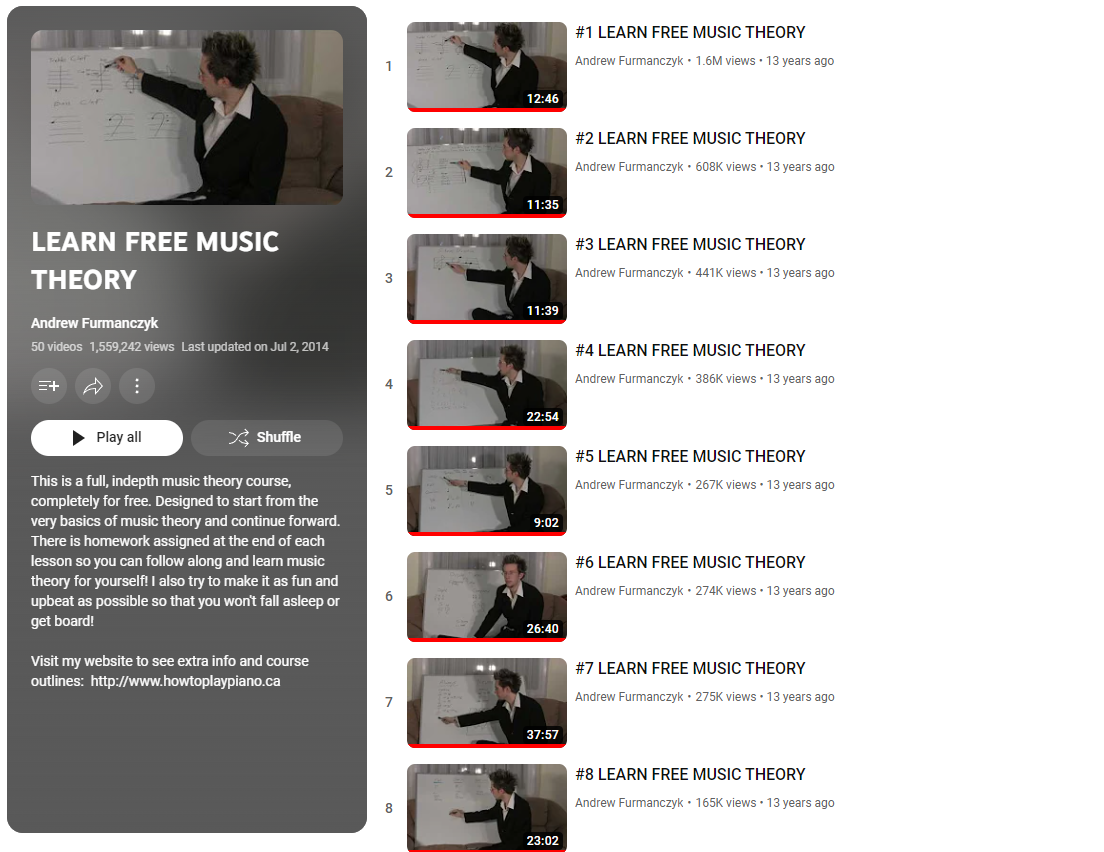Music Theory is Pretty Hard, but It's So Interesting
Since summer, I had a goal to dive in and learn about music theory, which is the language of music. Music theory explains how music works, how it’s structured, and puts music into written form.
I started learning music theory to read music from the music sheet. Sometimes, when I picked a new song to learn, I needed clarification about counting rhythm, which key signature the song was in, and which letter the note was. So, learning music was pretty important to me, haha.
I had an understanding of how to read music before singing. I used to play the violin for a couple of years in middle school, so I was able to grasp some parts of it. Unfortunately, I forgot how to read music after not playing an instrument for so long. So, when I started singing in college, I felt like I had to start over.
Anyway, I've looked up music theory on YouTube and found someone with a playlist on music theory lessons - FOR FREE. This amazing and generous man, Andrew Furmanczyk, uploaded this course over 13 years ago - and I seriously hope he is doing well today. He is a great teacher; his humor and jokes make the lessons fun and easy to watch.
The playlist has 50 videos. For the past few months, I spent over 100 hours watching the lessons and doing the homework at the end of each lesson. That sounds like a lot, right? That was my second attempt, too. I was inconsistent when I started, watching videos on and off for weeks. Also, I skipped the homework the first time. Then, when I took the "exam,” I failed miserably. And it was only the beginner/Level 1! So that was why I had to rewatch them.
After that, I got the motivation to start over and rewatched the first level again. This time, I did all the homework and watched the videos consistently - learning at least a few hours daily. And then…I finally passed the first exam!
But after the first exam…I was already so invested in music theory. I suddenly became obsessed with learning this topic because it is so interesting. I originally wanted to learn how to read music, but then I became passionate about learning more. I've been singing for a while, and it was so exciting when things were finally clicking into my brain. I barely knew the basics of music theory, such as notes and rests. But when Andrew explained topics like the Major and Minor Scales, Whole Tones vs. Semi-Tones, and Key Signatures with the Circle of Fifths, my mind exploded (in a good way).
"This makes so much sense now!”
Level 2 introduced me to topics I'd never seen before, and I was proud of myself for understanding the intermediate level. However, when I got to Level 3, things got a lot more confusing, and it was way too advanced for my small brain, haha. However, I completed the entire course, which was quite a rewarding experience. I told myself not to be too hard on myself for not understanding the Level 3 concepts because it at least introduced me to them. Now, I could recognize these topics in case I encountered them.
Personally, I believe Level 1 topics would suffice for those who want to start music theory. I also want to share what I've learned that I feel confident now:
Basic stuff like note and rest values
The letter notes on the staff for both Treble and Bass clef
Time signatures
Duple time vs. Compound time
Whole Notes and Half/Semi-Tones Notes
Key Signatures
Circle of Fifths
However, there are a few topics on this level that I want to improve on:
Major and Minor Scales
Intervals
Triads
For example, I would like to memorize all the major and minor scales, but… it's a lot of scales. There is a consistent pattern, but I would like to know it by heart if someone asked me, "What's the G major scale?!" on the spot. Haha, you know what I mean?
Level 3 has topics like imperfect cadence, augmented and diminished triads, and compound intervals…. It sounds complicated, right? I realized that music theory is like learning math - it's easy and fun at first…until you add more letters and formulas, haha.
After completing this series, I reflected on my strengths and weaknesses in music. Now that I learned about theory, it's time to learn how to apply it. I can read the music sheet now, but what does the song sound like? After all, music is supposed to be for hearing. My next step in this journey is to learn music tangibly, like improving rhythm and ear training.
I have a bit of a disadvantage because I'm in my twenties. If you were to learn music as a kid, you would quickly recognize and grasp the rhythm and notes. However, it's still doable. Relative pitch is as close to perfect pitch, and anyone can accomplish it. In the future, when I'm listening to a song, I want to recognize its scale, pitch, and chords. As for rhythm, I want to understand the beats and instruments used in the songs. I think it’s going to be fun learning!
I'm excited to continue this music theory journey with singing and songwriting/producing, and for the vibes! I can't imagine life without music. I recommend learning the basics and beginning level if you are pursuing music. Again, it's free on YouTube!
“Art is how we decorate space, music is how we decorate time.”
I hope you enjoyed this blog post. If you already know music theory, let me know what it was like learning for you! (And share a tip or two for me, please.) Until then, thanks for reading!
Links:

